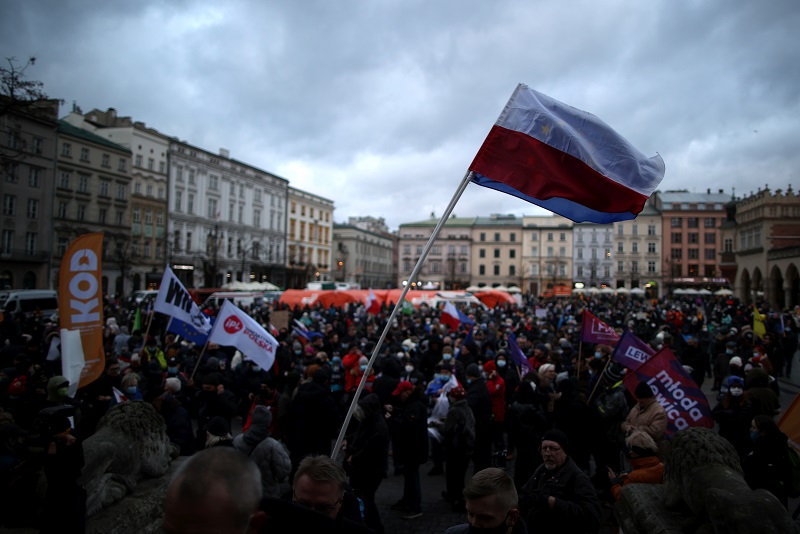This piece is published in collaboration with Gazeta Wyborcza as part of a content series on threats to independent media in Central Europe. Read more.
The article is available in Polish on Gazeta Wyborcza’s website.
In Poland, the media landscape is made up of the following: outlets controlled or heavily influenced by the government and the ruling party, Law and Justice (PiS); a small number of independent and critical outlets which face increasing challenges to their work; and a final group which often hesitate to openly criticize the government’s anti-democratic moves and sometimes work directly with it. It is the latter outlets which could tip the balance. If they see that authorities are damaging the foundations of democracy, their contribution to defending the free media will be difficult to overestimate.
What PiS has
PiS’s largest media resources are the public television and radio broadcasters. The free public television channels (including TVP 1, TVP 2 and TVP Info) have a reach covering 99.66% of Poland’s territory. The arrival of digital signal has given Polish commercial television channels – TVN and Polsat – a similar reach (around 98%). For years, their news programmes (TVP’s “Wiadomości”, TVN’s “Fakty” and Polsat’s “Wydarzenia”) have been the three most watched. “Fakty” is first, with an audience share of 21.7% (2.32 million), according to research by consumer research organisation Nielsen, followed closely by “Wiadomości” (19.8%, 1.941 million). Polsat’s “Wydarzenia” is third with 15.4% (1.406 million).
TV news is the main way that Poles stay informed on current affairs. TVP’s “Wiadomości” spreads lies, manipulation and party propaganda, while Polsat’s “Wydarzenia” is hesitant to report critically on the authorities and sometimes simply favors them, if only by bypassing information and scandals that are uncomfortable for PiS. TVN’s Fakty is the main independent evening news programme, and recently came under threat when the PiS attempted to pass a law, lex TVN, to increase their influence over its message.
In terms of news channels, the data for the same period puts TVN 24 first (with an audience share of 5.39%), followed by TVP Info (4.06%) and Polsat News (2%).
Here, we can see that people “do not buy” propaganda. The size of TVP Info’s audience has fallen by 25.35% and is decreasing every year, even though the channel’s signal reaches 90% of receivers, whereas the TVN 24 and Polsat News signal reaches 60%, and only those people with cable television.
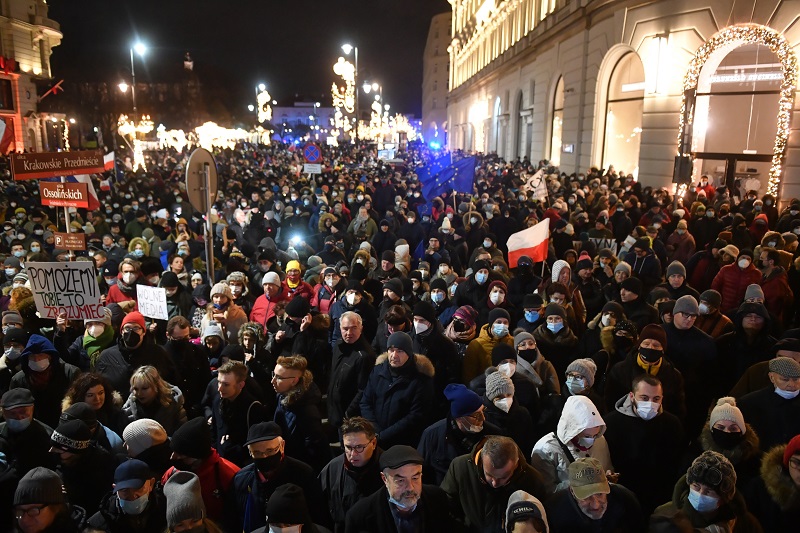
Supporters and members of opposition parties take part in a protest against the lex TVN law. Photo: EPA-EFE/Radek Pietruszka
“What can be done so that you win the elections?”
Since the destruction of the once very popular Polish Radio Three – by putting ruling party loyalists in the management, by imposing pro-regime political line on news, by laying off independent journalists or forcing them to leave – public radio and television have been fully dominated by the authorities. The government’s main representatives – President Andrzej Duda, Prime Minister Mateusz Morawiecki and PiS Chairman Jarosław Kaczyński – mainly give interviews there. They know that they will not get uncomfortable questions.
“What can be done so that you win the elections?” Danuta Holecka, one of the stars of “Wiadomości”, asked President Duda with concern on July 10, 2020.
PiS has turned the public media into a ruthless propaganda tool. Operations, on behalf of those who hold power, are controlled by TVP Chairman Jacek Kurski, one of the closest associates of Kaczyński, who knows that his party’s rule largely hangs on the message of the public television broadcaster.
The media fully controlled by the authorities also include the Polish Press Agency, the state treasury company sending domestic and foreign dispatches to editorial offices across Poland. Independent media outlets are rarely quoted in its daily press reviews, scandals are hushed up and media outlets that support PiS – Gazeta Polska, the Sieci weekly, Nasz Dziennik or Radio Maryja – are given preference. The foreign news team often gets its information from far-right American website Breitbart (formerly run by Steve Bannon who would later advise Donald Trump), and Fox News.
The Polish Press Agency’s Supervisory Board is chaired by Maciej Świrski, the creator of an organization supported by the government that – under the grotesque name Reduta Dobrego Imienia (the Good Name Redoubt) – deals with the “struggle for Poles’ dignity” by pursuing independent researchers of the Holocaust, among others. Świrski has also co-authored a bill disciplining the media (he wants journalists to face immediate responsibility for published content and allows for rulings in these cases without defendants’ participation, among other things). He absolutely hates Gazeta Wyborcza, TVN, Onet, and other independent and critical media.
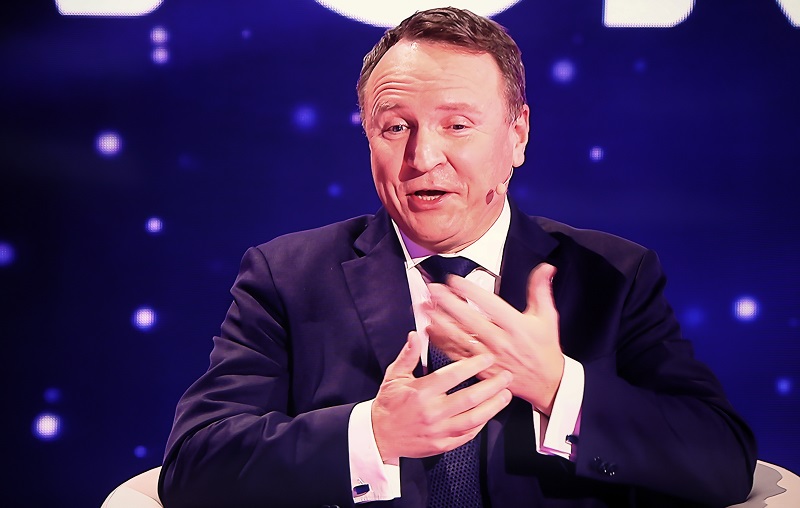
Chairman of the Polish public broadcaster TVP Jacek Kurski. Photo: EPA-EFE/Leszek Szymanski
Orlen Press – “The best news in recent years”
Yet the ruling party’s full control is not limited to media outlets that the authorities can take over as the state treasury’s property.
At the start of 2021, state-owned fuel company Orlen bought Polska Press group from its German owner. It is made up of 20 regional dailies, 50 weeklies and internet portals with around 16 million users. Polska Press’s dailies are just a shadow of the local media’s former power – print copy sales reach only between 15,000 and 10,000 copies, or even as low as 1,800. Yet after the group’s purchase by Orlen was announced, Kaczyński said: “This is one of the best pieces of news I have heard in recent years.”
After the purchase, Orlen CEO Daniel Obajtek claimed that none of the editors-in-chief would be fired. Then Dorota Kania from Gazeta Polska, who has made a good name for herself with PiS, took the helm of all the Polska Press newspapers. She has already replaced most of the dailies’ top editors with people who sympathize with the authorities and those who supported Obajtek in their articles while Gazeta Wyborcza described his suspicious business activities.
After the takeover by Orlen, the Polska Press dailies’ already weak sales fell by another dozen percent or so; in the case of Dziennik Zachodni, the number of readers fell by as much as 45%. Yet the example of Radio Three, which has record low audience numbers, shows that the authorities does not assign much weight to the cost effectiveness of the media outlets they have taken over. In certain cases, it is simply a matter of taking them over, getting rid of people considered uncomfortable, and controlling their content – even at the cost of a dramatic fall in their revenues.
Assault troops
Among the private media outlets that openly support the authorities, there has long been fierce competition between those run by brothers Michał and Jacek Karnowski and those associated with Tomasz Sakiewicz and his Gazeta Polska. The Karnowski brothers have the Sieci weekly and the wPolityce.pl portal with its own television channel and economic websites. In addition to Gazeta Polska, Sakiewicz has the Gazeta Polska Codziennie daily, the niezalezna.pl portal and Telewizja Republika.
Sakiewicz’s media outlets are veterans at PiS’s side. They have supported Kaczyński’s party practically since it was established and the network of Gazeta Polska Clubs plays an important role in their structures. Kaczyński often visits them and compliments them, calling them the “assault troops of an army that will march to victory”. In terms of business, Sakiewicz is openly linked to PiS. His daily is published by FORUM SA, which is owned by a company called Srebrna, the ruling party’s financial backbone.
The Karnowski brothers’ media outlets were established later and – as the veterans from Gazeta Polska often remind them – their founders and journalists previously worked at publications critical of the right. That is history – today, the Karnowskis are literally competing against Sakiewicz to be closest to Kaczyński.
One of the fields of this rivalry is TVP, where a battle for equal participation in journalistic programmes is underway. As a result, Sakiewicz, the Karnowski brothers and their columnists are the sole commentators on the “Wiadomości” news programme and the journalistic programmes’ most frequent guests. In this situation, Telewizja Republic is struggling; TVP pinched many of its staff to run its own programmes.
The Karnowski brothers also have strong business links to PiS. Their company Fratria’s main shareholder is a company called Apella, which is part of the Polish credit union system. This explains why their media outlets defend the credit unions’ interests and give PiS Senator Grzegorz Bierecki, the credit unions’ founder, space on their pages.
Favouring the party pays off for both groups. The Karnowskis’ and Sakiewicz’s media outlets are full of ads by state treasury companies that PiS has taken control of: Orlen, Lotto, PKO BP, PGE, PGNIG, PKP, PZU, Lotos, PGZ and many others.
The huge – and constantly growing – revenue from ads accounts for three-quarters of these groups’ profits, including those of media outlets like Gazeta Polska Codziennie, that not many people buy, with around 10,000-12,000 copies sold per day. Fratria reported a stagnant PLN 36.6 million total revenue in 2020, however increased its ad revenue to 84% of total, and doubled its profit. The Gazeta Polska weekly had PLN 16 million in advertising revenue, similarly to Gazeta Polska Codziennie. Despite comparable revenue, TV Republika is causing losses from year to year, with an audience size within the margin of error.
Another source of massive support for the authorities are the media outlets run by Tadeusz Rydzyk. The Toruń-based redemptorist controls Radio Maryja, Telewizja Trwam and Nasz Dziennik. He has a group of fans that is even older than Gazeta Polska, the Rodzina Radia Maryja (Radio Maryja Family), and a reach that covers all of Poland, also reaching the Polish diaspora abroad.
Despite periodic disputes (mainly over abortion or its attitude to Antoni Macierewicz), Rydzyk’s media outlets do not let PiS down on the most important subjects. In exchange, the government spoils them with money (according to calculations by OKO.press, the authorities have pumped around PLN 325 million into Rydzyk) and officials get invited to events organized by the radio station and feature on its airwaves and on TV Trwam. According to Press, around 20.7 million people in Poland listen to the radio. Radio Maryja currently has an audience share of around 2.2% – roughly 500,000 listeners.
Sales of Nasz Dziennik are not subject to control by the Press Control and Distribution Union. Its publisher claims that it sells 100,000 copies, but the newspaper’s pages constantly feature requests asking readers for financial support due to its difficult situation.
Other nationwide media outlets on the side of the authorities are: Radio WNET (a nationwide radio station with a tiny audience led by Krzysztof Skowroński, head of the pro-government Association of Polish Journalists), the DoRzeczy weekly and the Catholic Niedziela (high circulation, disseminated by parishes). However, the latter two sometimes publish texts that indicate that their editorial offices do not always support PiS’s actions.
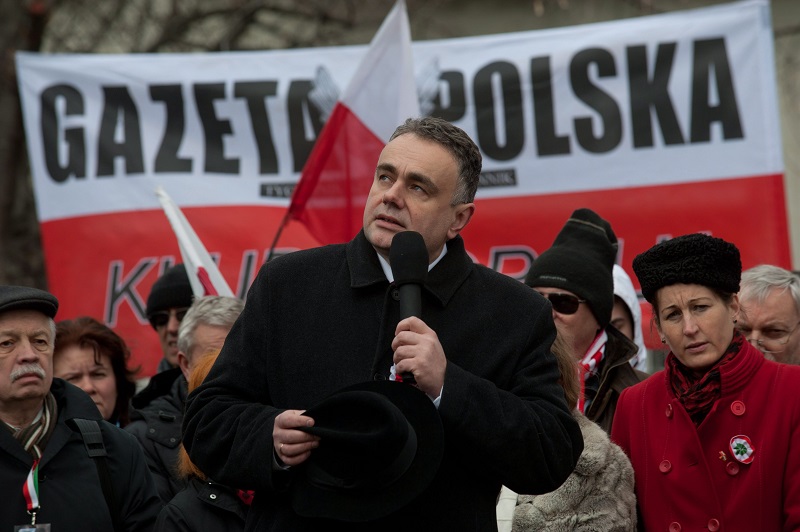
Editor-in-Chief of Gazeta Polska Tomasz Sakiewicz pictured in 2013. Photo: EPA/Bea Kallos
Waverers and symmetrists
Between the pro-government and independent media outlets, there is a large group of very influential ones that respect standards, while trying not to expose themselves to the authorities too much. They avoid propaganda, but bypass or downplay some of the PiS scandals.
Polsat is the most important outlet in this group. Zygmunt Solorz’s television channel is the third most watched in Poland (after TVP 1 and TVP 2). Its flagship news programme (“Wydarzenia”) is also third. “Wydarzenia” shows clearly the political line adopted by its owner and his team. It is overseen by Dorota Gawryluk (the editor-in-chief) and Bogdan Rymanowski, who was brought over from TVN in 2018.
Both are known for their right-wing and conservative views; both also show professionalism and a high level of journalism. Under their leadership, “Wydarzenia” does not watch the authorities too closely and reports on scandals revealed by other media outlets quite perfunctorily, keeping its distance.
Reporting on the conflict surrounding the lex TVN, Polsat has done everything not to mention the rival television channel’s name (sometimes, this is downright arduous). Neither Gawryluk nor Rymanowski signed the journalists’ letter in defense of TVN. Interia (bought by Solorz in 2020) and, to a lesser extent, RMF FM have kept their distance from the abuse of power to a similar extent.
Eventually, TVN survived the “lex TVN”, which was an attempt to force the U.S.-based media conglomerate Discovery, Inc. to sell its majority stake in TVN, the owner of TVN24, Poland’s most popular TV news channel. In late December 2021, President Duda vetoed that bill, due to domestic and international protests, and US official interventions.
Polsat and RMF are among the few media outlets that are private and independent of the government that the government still talks to.
At Polsat, PiS people and President Duda go to Gawryluk and Rymanowski. At RMF, they go to Krzysztof Ziemiec, a TVP presenter who has his Saturday programme on the radio station. Are people associated with the authorities treated more leniently there? The viewers and listeners need to decide for themselves. The authorities are less eager to talk to Robert Mazurek, who runs RMF’s morning broadcasts. Although Mazurek has a right-wing pedigree, he can put pressure on his interlocutors and be merciless, regardless of political provenance. Only a few names from RMF signed the letter in defense of TVN. We heard from one of the journalists that they had been advised not to get involved in the matter. Editor-in-chief Marek Balawajder denies this. “At RMF FM, these kinds of decisions are made by journalists individually. Nobody forbids anyone from doing anything,” he wrote to us.
The case of Super Express
Super Express is the third-largest daily in Poland in terms of print sales. It has a daily circulation of around 96,000 copies. Like most print media, the tabloid records yearly losses. Its numbers on digital subscribers are unknown. Super Express, which for years specialized in tracking down scandals concerning whoever was in power, is unusually gentle towards the PiS government.
Furthermore, the tabloid likes to attack the opposition and the ruling party’s opponents. For example, when Gazeta Wyborcza revealed the scandal concerning face masks that the government had acquired from a friend of the Minister of Health, Super Express focused on tracking down our sources and accused Roman Giertych of betraying lawyer’s secrets.
The daily is owned by Zbigniew Benbenek, an entrepreneur who emerged from the left. In the past, he was attacked by the right (Gazeta Polska), which accused him of links to the communist-era security services, revealing Institute of National Remembrance materials concerning him.
Later, the lustration-related commotion around him subsided and Sławomir Jastrzębowski took over the reins at the daily. His editorial team’s line was quite openly pro-PiS and, a few years ago, one of its deputy editors-in-chief, Tadeusz Płużański, even took part in the rosary procession against Gazeta Wyborcza. Jastrzębowski left his post in 2018 (his departure was accompanied by an incident involving drunk driving) and ended up at PR agency R4S, run by former PiS spokesman Adam Hofman. Unofficially, it is said that, although he has formally led the editorial team, Jastrzębowski still has huge influence over Super Express. Today, he runs the Salon 24 portal, where pro-government content dominates, and is a frequent guest on TVP’s programs.
RMF issued a statement in which it expressed solidarity with TVN during the lex TVN. In it, the radio station recalls how, during the SLD government, its license was changed, forcing it to close over a dozen local editorial offices and lay off 200 people. “The situation in which the TVN 24 channel has found itself may lead to the conclusion that media freedom in our country will be destroyed in this way. We express our solidarity with TVN 24’s journalists and their families, who face losing their jobs. We cannot be silent when the fate of hundreds of colleagues depends on incomprehensible decisions that are not made in accordance with the law in force.”
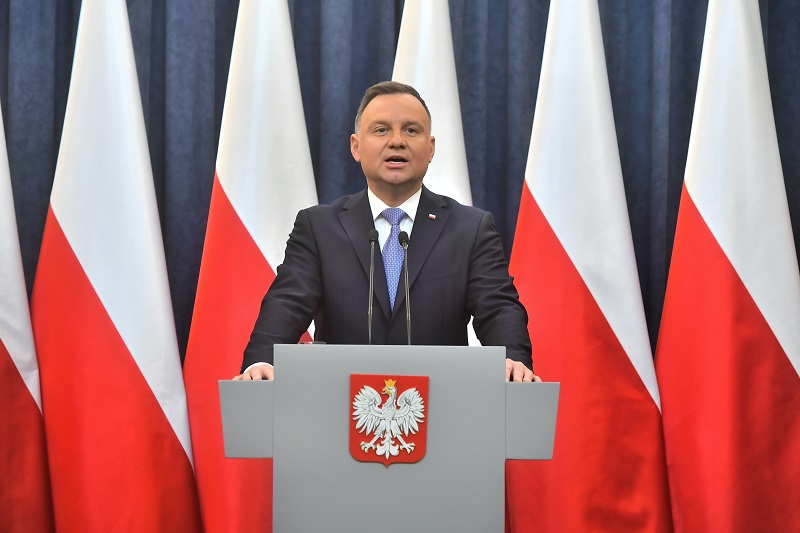
Polish President Andrzej Duda speaks during a press conference after vetoing the lex TVN law. Photo: EPA-EFE/Andrzej Lange POLAND OUT
WP striking out for independence
In February 2020, OKO.press revealed that Wirtualna Polska, one of the three largest news portals in Poland, has an informal arrangement with Zbigniew Ziobro and his milieu, which was involved in destroying judicial independence. Dozens of articles were being published on wp.pl supporting Ziobro to a greater or lesser extent. Some were written by fictitious journalists (the name Krzysztof Suwart has gone down in history).
According to OKO.press, the articles by “Suwart” may have come from Ziobro’s wife, Patrycja Kotecka, a former TVP journalist who is now rising through the ranks at a subsidiary of insurer PZU. A scandal broke out and wp.pl’s editor-in-chief Tomasz Machała had to step down.
Trying to make up for the damage to its image, wp.pl hired journalists known for tracking down PiS scandals and writing investigative articles on politics behind the scenes. However, when it comes to political commentary, wp.pl is keeping its distance.
This is why the following comment by wp.pl author Michał Gąsior is noteworthy. On August 11th, 2021, PiS party lost the vote in the Sejm (the lower chamber of parliament) on the motion to postpone the “lex TVN” vote. Then, Speaker of the Sejm, Elżbieta Witek, ordered “resumption”, and PiS won. In his commentary written, after the famous “resumption”, Michał Gąsior did not mince words. The title – “Banditry in the Sejm. Kukiz and Witek as the symbol of disaster” – says everything:
“We have seen many things since the Law and Justice (PiS) party came to power, but what just happened in the Sejm, the lower chamber of parliament, is a total disaster. Jarosław Kaczyński, along with Paweł Kukiz [a small party leader, a rock musician, supporting the ruling party], are laughing in voters’ faces. If we do not call out the repetition of key votes on the ruling party’s whim, then we really have done well in the reality of the PiS-ruled state. Speaker Witek’s behavior can not only be treated as a crime and an overstepping of her authority; it also shows – once again, clearly and shamelessly – how low this leadership has sunk and what it is capable of. Today’s scenes will go down in history.”
It shows that the authorities cannot count on goodwill and are even losing favor with media outlets that had so far chosen to tread cautiously. The day after the notorious “resumption”, wp.pl published an equally harsh comment by Kataryna [a pseudonym]. “What happened in the Sejm is such a scandal that I would gladly conduct a resumption of the 2015 elections, when I had a hand in PiS coming to power. This is no longer politics, not even dirty politics, it is […] ‘a somewhat gangster trick’,” writes the author, who once favored PiS.
After TVN, they will come for the others
During the sixth year of PiS rule, the fully independent media outlets in Poland keeping the government in check are: TVN, TVN 24, radio stations Radio Zet and TOK FM, Internet portal Onet, dailies Gazeta Wyborcza, Rzeczpospolita, Fakt, Dziennik Gazeta Prawna, and weeklies Newsweek, Polityka, Angora and Przegląd.
The authorities are doing everything to weaken them.
Despite good sales, there are no ads by state-owned companies for them. During the pandemic, Gazeta Wyborcza did not even get announcements containing government guidelines about how citizens should behave. Lawyers hired by state entities, PiS politicians and people associated with the party react instantly to articles on scandals. Gazeta Wyborcza has faced around 75 lawsuits from the authorities. The situation is similar for TVN and others.
Journalists and editors considered “uncomfortable” are constantly attacked in the public and pro-government media. Rzeczpospolita’s owner, Grzegorz Hajdarowicz, claimed that he was being induced to sell the daily. Onet and Fakt are regularly insulted by PiS and its media outlets, which accuse them – without a shadow of proof – of “favoring the Germans”.
Andrzej Duda was speaking about Fakt when he shouted, during the 2020 presidential election, that “the Germans won’t elect our president for us”. He was referring to an article taking a behind-the-scenes look at how Duda, had pardoned a pedophile. If we count TVN and TVN’s audience, Radio Zet and TOK FM’s listeners, and the readers of Onet, Gazeta Wyborcza, OKO.press, Tygodnik Powszechny and the other dailies, the free media is still a major force in Poland and a source of reliable information for a few million people. Yet it is difficult not to notice that this sphere of liberty is shrinking year by year.
The authorities’ attack on TVN station using the “lex TVN” showed that, in the eyes of PiS, this is still too much. Despite Duda’s veto, there is still a sword of Damocles hanging above TVN’s head. The PiS-controlled broadcasting media regulator fails to prolong the licences of TVN’s channels (other than TVN 24). The same regulator suggests that PiS should prepare a yet another “anti-concentration” bill that would deprive foreign investors of majority stake in Polish media companies. SLAPP cases and other lawsuits, brought against independent media by authorities and their various agencies, individual politicians and loyalist state-owned companies managers, are mounting.
Therefore, it is clear that, even if for now not for TVN, they will come for others.
This piece is part of a content series on threats to independent media in Central Europe in collaboration with leading independent media in the region. Any viewpoints expressed in these articles do not necessarily represent the views of IPI. Read more.

